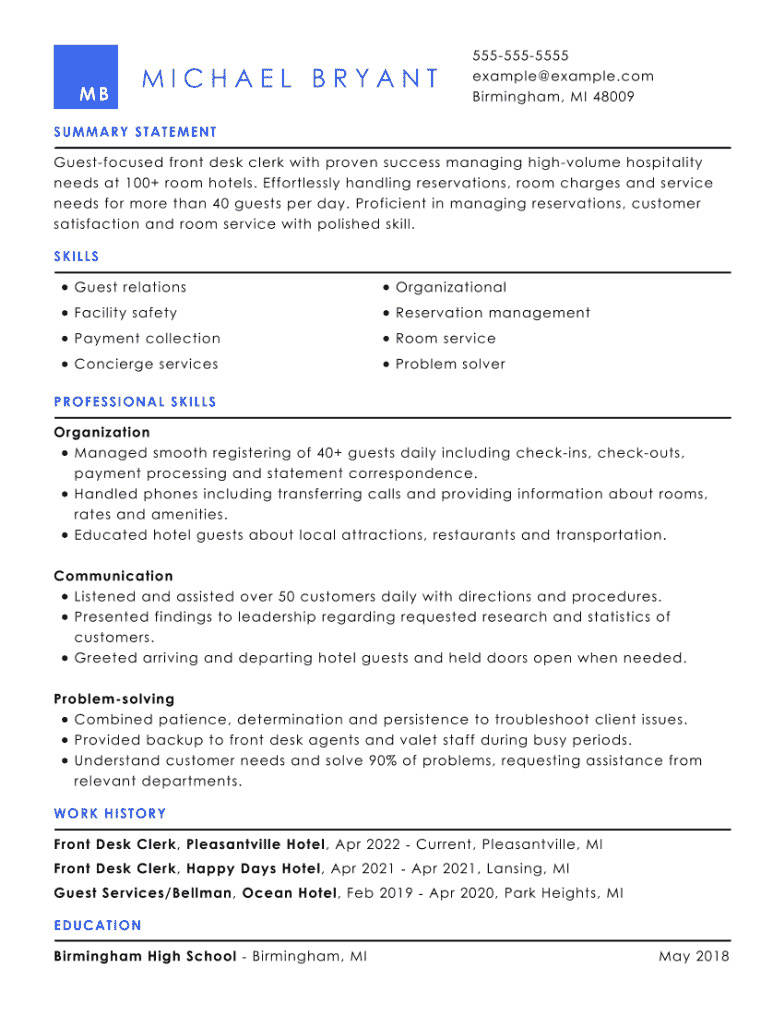Hospitality CV examples to help you succeed
Hospitality is about combining people skills and practical skills. How do you do this in the best possible way in your CV?
Hospitality is about combining people skills and practical skills. How do you do this in the best possible way in your CV?





OUR USERS HAVE BEEN HIRED BY

The hospitality industry includes a wide variety of jobs, so it requires a wide variety of talents. As the name suggests, part of the hospitality industry is providing good customer service. However, making sure your talents shine and ensuring that you’re showcasing the same talents that are present in the job description isn’t always easy. Here’s what you need to do to make sure you’re presenting the best CV for a hospitality position.
There are many hospitality jobs out there, and if you’re planning to be a hospitality worker, it’s best that you know what constitutes a “hospitality worker” in the first place. If you are working in any of these jobs, then you can likely use writing tips for hospitality CVs.
Although the CV templates you use for each job will have some differences, you’ll still be able to use the same tips below for all CVs in this industry.
Hiring managers and recruiters are typically looking for a hospitality CV that emphasises your interpersonal skills as much as hard skills. Sure, a great CV should include relevant professional experience, should have a robust skills section, and should be in the best CV format for the skills and experience you’re providing. However, if you’re not good with people and you don’t like being around them, a recruiter is probably not going to be interested in moving forward with a job interview. Emphasise your ability to work with both customers and coworkers.
Because hospitality covers a wide variety of jobs, there are many related skills you can feature in your CV. If you want to make it through an Applicant tracking system (ATS) that hiring managers use to scan and review CVs, then it’s a good idea to look at the job description and pinpoint skills you also possess, and have acquired through experience. Here are a few skills to consider in your CV writing process:
This list includes both hard skills and soft skills. Although soft skills tend to be much more important for hospitality CVs, it’s important that you don’t just list soft skills, especially because soft skills are usually more difficult to verify. Including hard skills such as data entry skills or knowledge of specific concierge software puts you ahead of other job seekers and opens you up to a variety of job titles.
Relevant work experience belongs in this section. You should feature responsibilities and achievements that are relevant to the job you want. Keep in mind, however, that you have many potential options on what to include in here. For instance, you can include volunteer, internship and academic experience, as long as it relates to the position and even experience in related fields.
If you’ve ever received an award for your work in a related arena, then you can list them under achievements and awards. This can include academic achievements and awards; while it’s typically not suggested to include your grades, for example, you may want to include any academic awards.
Most hospitality positions don’t require any special certifications. However, if you already have related certifications, like a food handler’s licence or certification in a foreign language, you can include that here if there’s a chance it can come in handy on the job.
When you’re using the CVHelp CV builder to build your hospitality CV, you may also want to look at CV samples to help. A hospitality CV sample can help you build your own CV more effectively, even if you don’t have a lot of experience in the job search process.
Tips for creating your hospitality CV:
It’s always a good idea to submit a cover letter with your CV, whether you’re applying for your dream job or an entry-level job. You can use CVHelp to help you find a hospitality cover letter example that you can draw ideas from to improve writing your own cover letter.
Many hospitality jobs are available with no experience. Although these may be entry-level jobs, you can still use them to build valuable hospitality skills that you can leverage to move up in the industry. When aiming for this type of job, focus on the relevant skills and training you already have, rather than your work history.
Yes. The reason for this is CV keywords. You can find keywords in every job description that reflect what the recruiter wants to see in a potential candidate, including specific skills and job requirements. If you’re able to show qualifications that match these keywords in your own CV, then you’ll be more likely to get the job than someone else, even if you both have the same certifications and skills.
We personalize your experience.
We use cookies in our website to ensure we give you the best experience, get to know our users and deliver better marketing. For this purpose, we may share the information collected with third parties. By clicking “Allow cookies” you give us your consent to use all cookies. If you prefer to manage your cookies click on the “Manage cookies” link below.